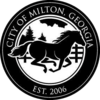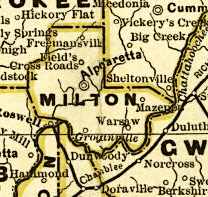Milton, Georgia facts for kids
Quick facts for kids
Milton, Georgia
|
|||||
|---|---|---|---|---|---|
|
|||||
| Motto(s):
"Named best quality of life in Georgia"
|
|||||
| Country | United States | ||||
| State | Georgia | ||||
| County | Fulton | ||||
| Incorporated | December 1, 2006 | ||||
| Area | |||||
| • Total | 39.11 sq mi (101.29 km2) | ||||
| • Land | 38.50 sq mi (99.72 km2) | ||||
| • Water | 0.60 sq mi (1.56 km2) 1.6% | ||||
| Elevation | 942 ft (287 m) | ||||
| Population
(2020)
|
|||||
| • Total | 41,296 | ||||
| • Density | 1,072.51/sq mi (414.10/km2) | ||||
| Time zone | UTC-5 (EST) | ||||
| • Summer (DST) | UTC-4 (EDT) | ||||
| ZIP codes |
30004, 30009
|
||||
| Area code(s) | 770, 678 | ||||
| FIPS code | 13-51670 | ||||
| GNIS feature ID | 2404269 | ||||
Milton is a city in Fulton County, Georgia, United States. It is located about 30 miles (48 km) north of downtown Atlanta. The city was officially created on December 1, 2006. In 2020, about 41,296 people lived there.
Milton is known as one of Georgia's wealthiest cities. People like living there because of its high quality of life. It also has excellent schools and a friendly community. The city is named after John Milton, a hero from the American Revolutionary War. He was also the namesake for the old Milton County.
Milton covers over 39 square miles of land. Much of this land is used for farming. The city has a rural feel with lots of open spaces. It also has a small-town charm but offers many benefits of a bigger city. Milton shares its borders with Cherokee and Forsyth counties. It is also next to the cities of Roswell and Alpharetta.
Contents
History of Milton, Georgia
Early People and European Settlers (1000-1832)
The land that is now Milton was once home to the Cherokee Nation. These Native American people lived in Georgia for over 10,000 years. They spoke an Iroquoian language. Their society was based on strong family ties and village life. They built ceremonial mounds and grew crops like corn.
European settlers arrived from coastal Georgia and the Carolinas. They traded with the Cherokee. Sometimes, they even married into Cherokee families. This created a mixed frontier society. However, the Europeans wanted more land. This caused problems between the two groups.
The discovery of gold in nearby Dahlonega in 1828 made things worse. The desire for land led to the sad Trail of Tears in 1832. President Andrew Jackson ordered the Cherokee to leave Georgia. They were forced to move to new lands in what is now Oklahoma.
Farming Life and Milton County (1832-1932)
After the Cherokee left, Georgia used a land lottery system. The last lottery in 1832 included the area that became Milton. New settlers came to own land. They turned the thick forests into farms. The area had many small farms where people grew food for themselves. There were also a few larger farms.
Cotton became an important crop to sell. Farmers also grew fruits, vegetables, and raised animals. Milton County was created in 1857. It was named after John Milton, a Revolutionary War hero. At first, the county did not want to leave the United States. But Georgia joined the Civil War, which greatly affected the people living there.
Around 1900, the area was still mostly farms and forests. There were small villages with stores, mills, churches, and schools. People still grew cotton to sell. The invention of the automobile changed things. Highway 9 was built in the 1920s. This helped connect Milton to the outside world.
However, Milton County faced many money problems. These included the Great Depression, a bug called the boll weevil, and a long dry spell. Because of these challenges, Milton County was dissolved in 1932. Its land became part of Fulton County.
Changes and Growth (1932-2005)
The area stayed mostly rural for many years. This was true even as North Georgia, especially Atlanta, grew very fast. People in Milton kept their old jobs and farming ways. Homes were far apart. The community centered around churches, schools, and local stores.
As Atlanta grew, more roads were built. People started moving further from the city. The building of State Route 400 brought more people and development. But Milton still kept its country feel. This was partly because of zoning rules. These rules favored large lots, good for horse farms and rural living.
Creating the City of Milton (2005-2006)
After 2000, people in northern Fulton County wanted their own local government. They felt that county officials far away did not understand their needs. So, a plan to create a new city began. Georgia State Representative Jan Jones introduced a bill for the city of Milton in January 2005. This gave residents a year to think about becoming a city.
On March 9, 2006, the bill to create Milton (HB 1470) passed easily. It passed in the Georgia House of Representatives and the Georgia State Senate. On March 28, Governor Sonny Perdue signed the bill into law. On July 18, voters approved the creation of Milton by 85 percent.
On August 4, Governor Perdue chose five people to be Milton's temporary government. The first election for Mayor and City Council was on November 7, 2006. Joe Lockwood became the first mayor. The city of Milton officially started on December 1, 2006. It adopted Fulton County's rules.
City Life and New Growth (2007-Present)
City leaders started working from temporary offices. They began to build Milton's unique identity. They planned to start Milton's own police services on May 1, 2007. The fire department started 16 days later.
City officials also created city laws and programs. They held community events. They moved into city-owned buildings. This included a new city hall (opened 2017) and a Public Safety Complex (opened 2020).
Joe Lockwood was mayor for Milton's first 15 years. Then, Peyton Jamison became mayor. City managers also help lead Milton. They make sure city laws are followed and services run well.
While Milton's government grew, so did its population. The U.S. Census counted 32,661 people in Milton in 2010. Ten years later, in 2020, there were 41,296 residents. This was an increase of over 26%!
Milton's Geography
Milton is located at the very northern part of Fulton County. To the south, it borders Roswell and Alpharetta. To the east, it borders Forsyth County and Alpharetta. To the north and west, it borders Cherokee County.
Milton's plan divides the city into eight "character areas." Each area has its own special features. These areas include Arnold Mill, Bethany, Birmingham, Central Milton, Crabapple, Deerfield, Milton Lakes, and Sweetapple.
Two main roads run north and south through Milton. These are State Route 9 (in the southeast) and State Route 372 (more central). State Route 372 is also called Birmingham Highway. State Route 140 (Arnold Mill Road) is in the southwest part of Milton.
The U.S. Census Bureau says Milton covers about 39.11 square miles (101.4 km2). About 38.50 square miles (99.8 km2) is land. The rest, about 0.60 square miles (1.6 km2), is water. The land in Milton is between 950 and 1280 feet above sea level.
As of April 2007, the US Postal Service recognizes Milton for ZIP code 30004. This ZIP code is served by the Alpharetta post office.
Milton's Population
| Historical population | |||
|---|---|---|---|
| Census | Pop. | %± | |
| 2010 | 32,661 | — | |
| 2020 | 41,296 | 26.4% | |
| U.S. Decennial Census | |||
Milton is home to 41,296 people, according to the 2020 United States census. There were 13,540 households and 10,366 families living in the city.
| Race | Number of People | Percentage |
|---|---|---|
| White (not Hispanic) | 25,802 | 62.48% |
| Black or African American (not Hispanic) | 3,882 | 9.4% |
| Native American | 74 | 0.18% |
| Asian | 6,446 | 15.61% |
| Pacific Islander | 10 | 0.02% |
| Other/Mixed | 2,068 | 5.01% |
| Hispanic or Latino | 3,014 | 7.3% |
Milton is one of the richest cities in Georgia. The average household income was $142,845. For families, it was $178,317. Between 2018 and 2022, 74% of people in Milton owned their homes. In September 2024, the average home price was $1,179,000. About 3.8% of the people live below the poverty line. Most of Milton is in ZIP code 30004, which has an average household income of $136,124.
Education in Milton
Public Schools
The city's public schools are part of the Fulton County Schools system.
Elementary Schools
- Birmingham Falls Elementary School
- Cogburn Woods Elementary School
- Crabapple Crossing Elementary School
- Summit Hill Elementary School
Middle Schools
- Hopewell Middle School
- Northwestern Middle School
High Schools
- Cambridge High School
- Milton High School
- FCS Innovation Academy
Private Schools
- Chandler Academy (Kindergarten to 8th grade)
- King's Ridge Christian School (Kindergarten to 12th grade)
- Mill Springs Academy (Kindergarten to 12th grade)
- St. Francis Schools (Kindergarten to 12th grade)
Transportation in Milton
Major Roads
Walking and Biking Paths
- Big Creek Greenway (Planned)
Famous People from Milton
- Dylan Cease (born 1995), a baseball pitcher in Major League Baseball.
- Brian Littrell (born 1972), an American singer and member of the Backstreet Boys.
- Gary Rossington (1952–2023), a guitarist and co-founder of the band Lynyrd Skynyrd.
See also
 In Spanish: Milton (Georgia) para niños
In Spanish: Milton (Georgia) para niños
 | Delilah Pierce |
 | Gordon Parks |
 | Augusta Savage |
 | Charles Ethan Porter |




